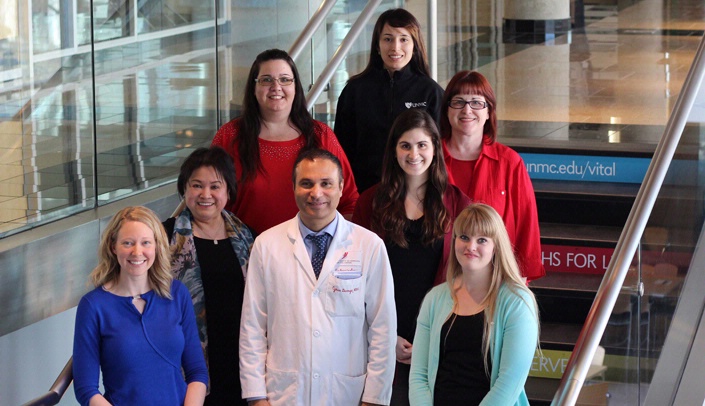In March, the UNMC site for the National Institutes of Health’s Glycemia Reduction Approaches in Diabetes (GRADE) comparative effectiveness trial reached its 100th recruit.
GRADE, which has been underway at UNMC since 2012, explores the most effective combinations of medications with metformin in order to control glycemic levels. UNMC is one of 45 sites nationwide taking part in the study.
About the study
GRADE is a randomized clinical trial of participants diagnosed with type 2 diabetes within the past 10 years who are already on metformin. Participants will be randomly assigned to one of four commonly-used glucose-lowering drugs (glimepiride, sitagliptin, liraglutide, and basal insulin glargine), plus metformin, and will be followed for up to seven years. For more information, click here.
The study was instituted in response to the proliferation of glycemic control drugs designed to be used in combination with the accepted drug of first choice, metformin.
“Everyone knows metformin is the first drug of choice, due to all the research done, but within the last 10 years, a huge number of new drugs have come out in three or four new classes,” said Cyrus Desouza, M.B.B.S., UNMC’s principal investigator for the trial. “What happens is, prescribers will prescribe whatever they want to, without there being too much evidence about what combination might be best for which patient.”
The study compares the different classes of new drugs in combination with metformin, not only for glycemic control but for the length of time the control lasts, for side effect profiles, and for whether different combinations are more effective in certain individuals by looking at their race, ethnicity or genetic profile.
“The main outcome is to see which combination overall is able to control the best, and for how long,” Dr. Desouza said. The study also explores how much glycemia levels are lowered by the combinations.
Two side benefits for participants, he said, is that it gives them access to medication that might not otherwise be affordable and it allows them to strictly monitor their glycemic levels.
“This is a comparative effectiveness trial,” Dr. Desouza said. “That means the patient is really going to get what they would have gotten anyway as an outpatient treatment, just grouped differently. All we’re doing is making it more formal. The patients really benefit.”
The study continues to enroll participants, but Dr. Desouza is hopeful it will reach its 150-participant ceiling by next April.
While the number of participating sites fluctuates, Dr. Desouza said that UNMC being chosen for the NIH study demonstrates the institution’s national reputation.
“Sites were chosen based on the strength of the principal investigator, the institutional level of support, the population that can be accessed, and the research experience of the institution,” he said.
